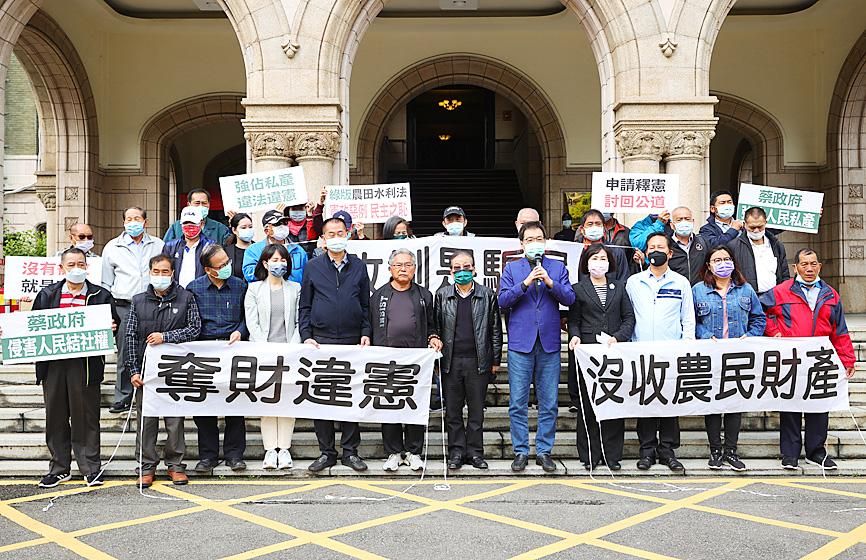A group of Chinese Nationalist Party (KMT) lawmakers yesterday sought a constitutional interpretation over the government’s move to nationalize irrigation associations.
The Legislative Yuan in July last year passed the Act of Irrigation (農田水利法) that converted 17 irrigation associations nationwide into a government body.
The Council of Agriculture in October last year inaugurated the Agency of Irrigation to oversee the associations, whose assets are valued at about NT$75.6 billion (US$2.67 billion).

Photo: CNA
Prior to the enactment, KMT lawmakers had opposed the move by seeking a constitutional interpretation, basing claims on Article 40 of the Organic Regulations for Irrigation and Water Conservancy Associations (農田水利會組織通則); but the appeal on Aug. 28 last year was turned down by the Council of Grand Justices, which said that the lawmakers had failed to meet standards outlined in the Act on the Council of Grand Justices Reviewing Constitutional Interpretation Requests (司法院大法官審理案件法).
In a second attempt yesterday, 38 KMT lawmakers tendered another request for the council to issue a constitutional interpretation of articles 23 and 34 of the Irrigation Act.
The Irrigation Act contravenes freedom of association and amounts to government seizure of private property, the lawmakers said, adding that it harms Taiwan’s democratic governance.
Based on the principle that laws should not be retroactive and the principle of legitimate expectation, associations should not be eliminated by a new law, the legislators said, citing the example of the Red Cross Society continuing to exist despite the abolishment of the Red Cross Society act in 2016.
The associations should continue to exist and would simply fall under the jurisdiction of the Civil Associations Act (人民團體法) and the Civil Code, they said.
The new act also contravenes the principles of legal reservation and proportionality, they said.
The abolishment of associations must have a legal basis — which the government lacks — and such an action should only be taken if there is a need to ensure the public good, the lawmakers said.
The irrigation associations have demonstrated that they are entirely capable of autonomous operation, they said.
The legislators also cited Article 8 of the Water Act (水利法), which designated the associations as a public corporation, saying that the Ministry of the Interior has no jurisdiction over association property, which should remain private.
The request was received by Hsu Chen-chou (許辰舟), head of the Council of Grand Justices’ Clerk Office.
The council’s response to the request would depend on whether it is up to standard, Hsu said.

Chinese Nationalist Party (KMT) Chairman Eric Chu (朱立倫), spokeswoman Yang Chih-yu (楊智伃) and Legislator Hsieh Lung-chieh (謝龍介) would be summoned by police for questioning for leading an illegal assembly on Thursday evening last week, Minister of the Interior Liu Shyh-fang (劉世芳) said today. The three KMT officials led an assembly outside the Taipei City Prosecutors’ Office, a restricted area where public assembly is not allowed, protesting the questioning of several KMT staff and searches of KMT headquarters and offices in a recall petition forgery case. Chu, Yang and Hsieh are all suspected of contravening the Assembly and Parade Act (集會遊行法) by holding

PRAISE: Japanese visitor Takashi Kubota said the Taiwanese temple architecture images showcased in the AI Art Gallery were the most impressive displays he saw Taiwan does not have an official pavilion at the World Expo in Osaka, Japan, because of its diplomatic predicament, but the government-backed Tech World pavilion is drawing interest with its unique recreations of works by Taiwanese artists. The pavilion features an artificial intelligence (AI)-based art gallery showcasing works of famous Taiwanese artists from the Japanese colonial period using innovative technologies. Among its main simulated displays are Eastern gouache paintings by Chen Chin (陳進), Lin Yu-shan (林玉山) and Kuo Hsueh-hu (郭雪湖), who were the three young Taiwanese painters selected for the East Asian Painting exhibition in 1927. Gouache is a water-based

Taiwan would welcome the return of Honduras as a diplomatic ally if its next president decides to make such a move, Minister of Foreign Affairs Lin Chia-lung (林佳龍) said yesterday. “Of course, we would welcome Honduras if they want to restore diplomatic ties with Taiwan after their elections,” Lin said at a meeting of the legislature’s Foreign Affairs and National Defense Committee, when asked to comment on statements made by two of the three Honduran presidential candidates during the presidential campaign in the Central American country. Taiwan is paying close attention to the region as a whole in the wake of a

OFF-TARGET: More than 30,000 participants were expected to take part in the Games next month, but only 6,550 foreign and 19,400 Taiwanese athletes have registered Taipei city councilors yesterday blasted the organizers of next month’s World Masters Games over sudden timetable and venue changes, which they said have caused thousands of participants to back out of the international sporting event, among other organizational issues. They also cited visa delays and political interference by China as reasons many foreign athletes are requesting refunds for the event, to be held from May 17 to 30. Jointly organized by the Taipei and New Taipei City governments, the games have been rocked by numerous controversies since preparations began in 2020. Taipei City Councilor Lin Yen-feng (林延鳳) said yesterday that new measures by